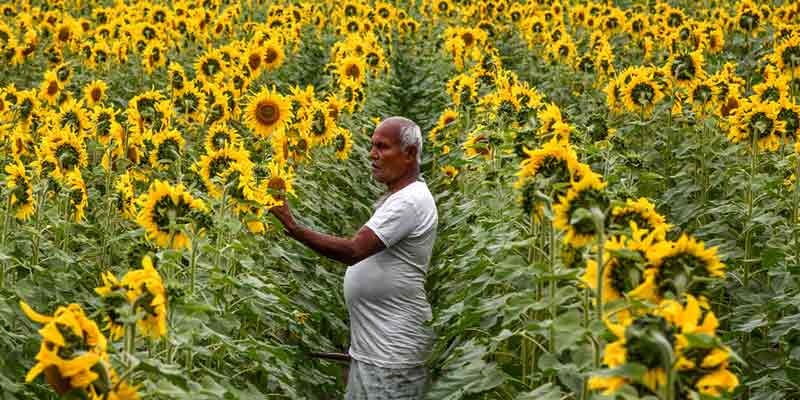- India
- Jul 19
Govt forms committee to strengthen MSP system
• The government formed a committee on Minimum Support Price (MSP), eight months after it promised to set up such a panel while withdrawing the three contentious farm laws.
• Former agriculture secretary Sanjay Agrawal will be the chairman of the committee. The government has made a provision to include three members from the Samyukta Kisan Morcha (SKM) in the panel.
• While announcing the repeal of three farm laws in November last year, Prime Minister Narendra Modi had promised to set up a committee to discuss the farmers’ demand for a legal guarantee on MSP.
• The agriculture ministry issued a gazette notification announcing the committee in this regard.
• According to the notification, the committee will look at ways to make available MSP to farmers by making the system more effective and transparent.
• It will also suggest the practicality of giving more autonomy to the Commission for Agricultural Costs and Prices (CACP) that fixes the MSP of Agri crops, and measures to make it more scientific.
• Further, the panel will look at ways to strengthen the Agricultural Marketing System as per the changing requirements of the country to ensure higher value to the farmers through remunerative prices of their produce by taking advantage of the domestic and export opportunities.
• Besides MSP, the committee will look at ways to promote natural farming, crop diversification, and micro irrigation scheme and suggest strategies for making Krishi Vigyan Kendras (KVKs) and other Research and Development institutions as knowledge centres.
What is MSP?
The Minimum Support Price (MSP) mechanism provides a price guarantee to farmers for their produce. This is implemented across the country as nearly 86 per cent farmers fall under the small and marginal category. It also helps in stabilising prices in the market and thus services the consumers as well.
Genesis of MSP
• India inherited an agrarian economy from the British with the agriculture and allied sector contributing to around three-fourths of the Gross Domestic Product (GDP) and providing employment to more than four-fifth of the population.
• The food shortages faced during the mid-1960s pushed India to reform its agricultural policy and accordingly India adopted significant policy reforms focused on the goal of achieving food grain self-sufficiency.
• Series of institutional reforms were undertaken to boost agricultural production and to modernise farming practices. These included land reforms, structural changes in the agricultural administrative arrangements, agricultural extension schemes, initiation of price support policies including the introduction of the minimum support price (MSP) for major agricultural produces, introduction of new technologies (popularly known as the green revolution), strengthening of agricultural research, etc.
What is the significance of MSP?
• The prices of agricultural commodities are inherently unstable, primarily due to the variation in their supply, lack of market integration and information asymmetry. A very good harvest may result in a sharp fall in the price of that commodity during that year which in turn will have an adverse impact on the future supply as farmers withdraw from sowing that crop in the following years. This then causes paucity of supply next year and hence, major price increase for consumers.
• To counter this, the MSP for major agricultural products is fixed by the government, each year.
• MSP is a tool which gives guarantee to the farmers, prior to the sowing season, that a fair amount of price is fixed to their upcoming crop to encourage higher investment and production of agricultural commodities.
• The MSP is in the nature of an assured market at a minimum guaranteed price offered by the government.
What is the process to fix MSP?
• The Commission for Agricultural Costs & Prices (CACP) is an attached office of the ministry of agriculture and farmers welfare. It was established in January 1965.
• It is mandated to recommend MSPs to incentivise the cultivators to adopt modern technology, and raise productivity and overall grain production in line with the emerging demand patterns in the country.
• MSP for major agricultural products are fixed by the government, each year, after taking into account the recommendations of the commission.
• CACP recommends MSPs of 23 commodities, which comprise 7 cereals (paddy, wheat, maize, sorghum, pearl millet, barley and ragi), 5 pulses (gram, tur, moong, urad, lentil), 7 oilseeds (groundnut, rapeseed-mustard, soyabean, sesamum, sunflower, safflower, niger seed), and 4 commercial crops (copra, sugarcane, cotton and raw jute).
• CACP submits its recommendations to the government in the form of price policy reports every year, separately for five groups of commodities namely kharif crops, rabi crops, sugarcane, raw jute and copra.
• Before preparing aforesaid five pricing policy reports, the commission draws a comprehensive questionnaire, and sends it to all the state governments and concerned national organisations and ministries to seek their views.
• Subsequently, separate meetings are also held with farmers from different states, state governments, national organisations like Food Corporation of India (FCI), NAFED, Cotton Corporation of India (CCI), Jute Corporation of India (JCI), trader’s organisations, processing organisations, and key central ministries.
• The commission also makes visits to states for on-the-spot assessment of the various constraints that farmers face in marketing their produce, or even raising the productivity levels of their crops. Based on all these inputs, the commission then finalises its recommendations/reports, which are then submitted to the government.
• The Cabinet Committee on Economic Affairs (CCEA) takes a final decision on the level of MSPs and other recommendations made by the CACP.
Manorama Yearbook app is now available on Google Play Store and iOS App Store

